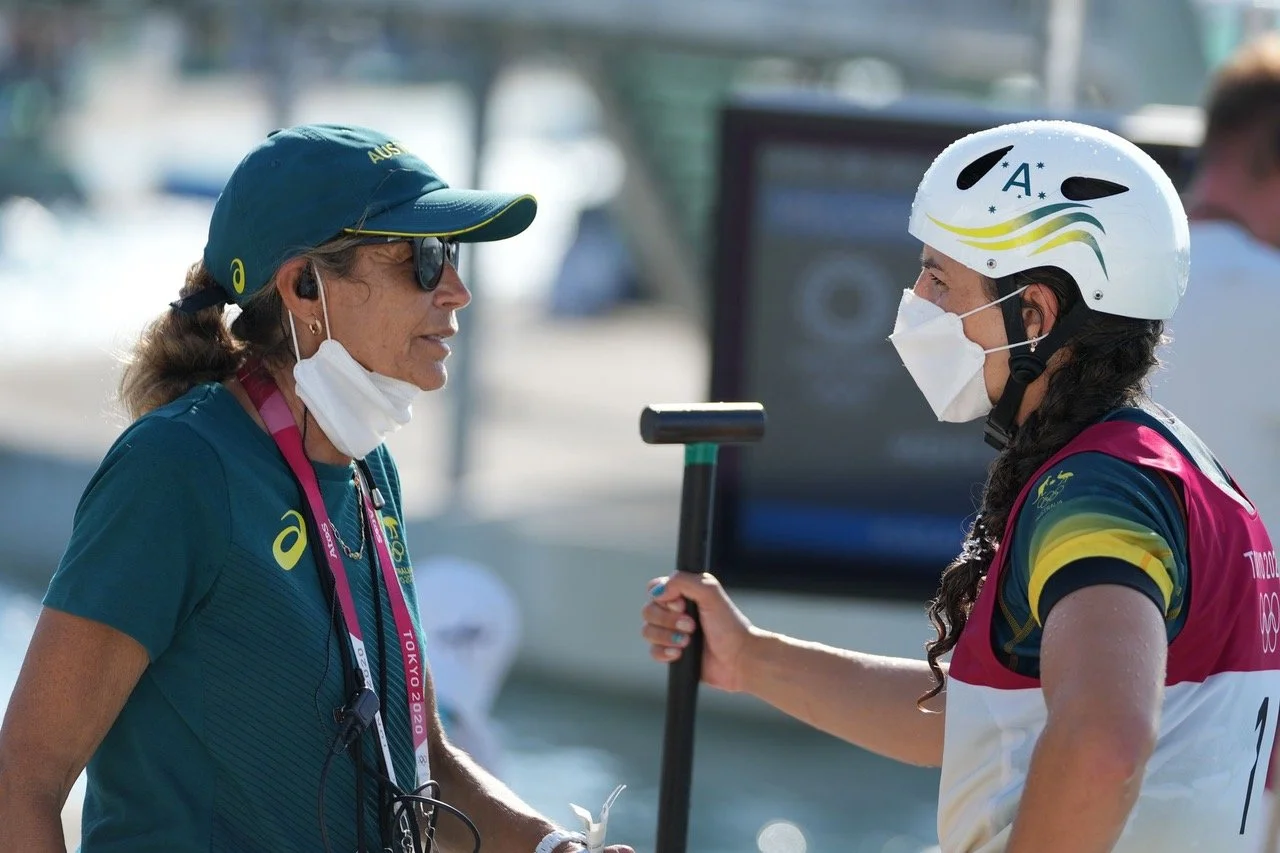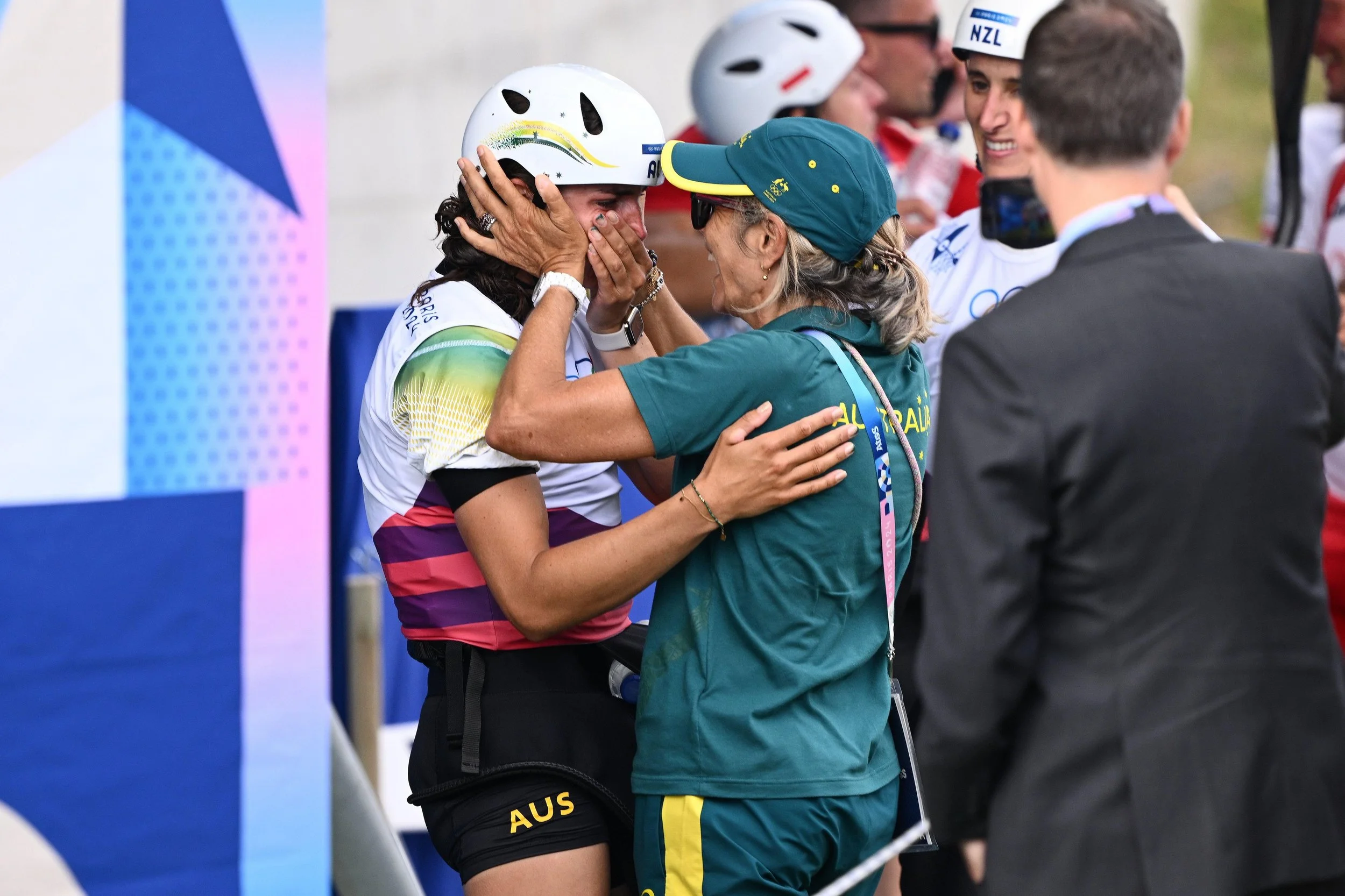Chart your course
Australian Associated Press / Alamy Stock Photo. Myriam Fox-Jerusalmi coached daughter Jess Fox (pictured right) to a historic gold medal in women’s canoe singles (C1) at the Tokyo 2020 Olympic Games
When Myriam Fox-Jerusalmi won bronze in the K1 slalom canoeing competition at the 1996 Atlanta Olympics, she knew it would be her last race. In her mid-thirties, already a mother and set on growing her family, the French-born athlete was ready for a new chapter.
In conversation with The 1v1 Project, Myriam reflects on the choices that shaped her career, the systemic battles she’s worked to dismantle, and why she believes women should never have to choose between ambition and life beyond sport.
“I had a very long career as an athlete until I was 35,” recalls Myriam. “After Barcelona 1992, I wanted to have a shot at another Olympics. But the clock was ticking and I had my heart set on having kids, too.”
In an era when female athletes rarely returned to elite competition after childbirth, Myriam charted her own course. With support from her husband and parents, she found a way to balance motherhood and training in the build-up to Atlanta 1996.
“When I look back, I don’t think female athletes with children were supported by the system. It was seen as a problem, especially if there was more than one of us. But I enjoyed the process of going to the Olympics. I earned my qualification for Atlanta, and I was at peace knowing it would be my last race.”
Motherhood and ambition
After retiring from competition, Myriam came across a job advert: a senior position as a national canoe coach in France. She had the credentials and experience – Olympic medallist, qualified teacher, and certified national coach – but was unsuccessful with her application.
“Perhaps they worried I was too close to the athletes, as I hadn’t long finished my career. They also knew I had a family,” says Myriam. “Today, I would probably react differently. You shouldn’t have to share your personal life when you apply for a job.
“As a mother in a high-performance environment, you may be judged on your motivation and ability to spend long periods abroad for training camps and competition.”
“As a mother in a high-performance environment, you may be judged on your motivation and ability to spend long periods abroad for training camps and competition”
She had a brief spell working in sports services in Marseille before her husband, a leading British canoeist, received a job offer in Sydney ahead of the 2000 Olympics. The family relocated to Australia, and it was there that Myriam’s door into coaching opened.
“I did a few unpaid hours to start with, just as a volunteer. Everybody knew my priority was my kids. They would tag along – I was encouraged to choose what worked best for my family and me – and everyone was happy.”
This arrangement allowed her to gradually increase her involvement until she accepted a full-time position with the Australian national team in 2004. Working with senior women and junior athletes, she found herself in an environment that valued her expertise and allowed her to be there for her family.
Myriam continued her legacy as an athlete by moving into full-time canoe coaching with the Australian national team
Challenging the system
Now in a full-time role, Myriam’s platform to make a difference for women in the sport was growing – and one issue quickly stood out. When she arrived in Australia, she discovered that the female athletes there were competing in events still off-limits to them at the international level.
The canoe singles (C1) event wasn’t available to women at the Canoe Slalom World Championships, while at the Olympic Games, men had three competitions – C1, C2 (canoe double) and K1 (kayak single) – and women had just one, the K1. No one had yet dared to challenge the system.
“I look back and think, ‘Why did we never question this as women?’ There was this tendency to accept things as they were. To believe we were lucky to have anything at all,” says Myriam. “We never fought and it wasn’t fair. I started to understand that it didn’t need to be like this.
“When I was a young athlete, I didn’t have somebody with me to say, ‘Hang on a minute. Why are these competitions too difficult for girls?’ I didn’t spend time trying to fight alone. I just got on with it and took the opportunities I had.”
“I look back and think, ‘Why did we never question this as women?’ There was this tendency to accept things as they were. To believe we were lucky to have anything at all”
Having found her place as a coach at the elite level, Myriam championed for global recognition of women’s events and used her voice to influence those in positions of power: “We spearheaded the change within the International Federation. We were resolute in saying, ‘We need to open all events to women because they are just as capable as men.’”
The path wasn’t easy. Male critics continued to claim that women “weren’t good enough” and simply “shouldn’t be at the Olympics.” Myriam, though, didn’t allow her belief to fade.
“I stood behind every female athlete. I said, ‘Don’t listen to them. We need time to catch up, to learn the technique, but we’re progressing. We will make it happen.’ I believed very strongly, and deep inside, that women were eventually going to be successful on the world stage.”
Australian Associated Press / Alamy Stock Photo. Myriam has coached daughter Jess to become one of the greatest paddlers in the world
Winning the battle
This persistence paid off. Women’s C1 was added to the Canoe Slalom World Championships in 2010, and 10 years later was finally introduced to the Olympic programme for Tokyo 2020.
Fittingly, Myriam coached her daughter Jess Fox to gold in the first-ever women’s C1 event at the Olympics – a victory that symbolised far more than personal achievement. It marked a long-overdue step toward gender equality in the sport she had spent years helping to transform.
“When Jess won the first gold medal in a canoe event, it was really extraordinary. A lot of countries were so happy for us because it was a kind of reward. We had won this battle of gender equity within the category.
“And many of the same people who had once fought against us later said, ‘You were right. The women are amazing. I’m sorry we didn’t support you.’”
Jess’s achievements now surpass any other competitor’s – male or female – in Olympic and World Championship events. Her younger sister, Noemie, is likewise carving out her own remarkable career, marked by a gold medal at Paris 2024 in the first women’s kayak cross (KX1) competition to feature at the Olympics.
Women inspiring women
Informed by decades of experience, Myriam reflects on the importance of representation in changing perceptions about women’s incredible capabilities in sport. She credits her mother – who divorced early and raised her independently – as her first role model.
“I didn’t have any role models in sport, but I had my mother. She was a strong woman who valued independence. She always had the message of, ‘Nothing is easy, you just need to do it. You need to dive in and work hard, then you’ll see what life has to offer.’”
This philosophy quietly guided Myriam throughout her career, helping her break barriers without fearing failure. She sees this same determination in the young female athletes she coaches.
“If you ask me who my role models are today, it’s the athletes I’m working with. They are fantastic young ladies: intelligent, motivated, tough”
“If you ask me who my role models are today, it’s the athletes I’m working with. They are fantastic young ladies: intelligent, motivated, tough. They’re driven. They don’t mess around. These are the qualities that never fail to wow me.”
For the next generation of female athletes and coaches, Myriam hopes her legacy will be one of inspiration: showing that women can succeed at the highest levels of sport – whether they’re raising families, forging new paths, or juggling competing demands. All it takes is a little drive and organisation.
“If I can inspire other female coaches, I would be very happy. I’m so glad that I’m involved with giving more opportunities to women to pursue what they’d like to do.
“But I don’t see myself as special – we all have the potential to make a difference. What’s important is we keep reminding each other that one woman’s strength can become another’s starting point. That’s how change spreads.”
Myriam Fox-Jerusalmi
FEATURED STORIES









